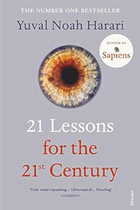21 Lessons for 21st Century
When I came across a snippet of an interview with Yuval Noah Harari on YouTube, where he discusses the drawbacks of AI and how it would render people ineffective and their jobs obsolete in the future, it greatly annoyed me. As a technophile, I thought to myself, “Here is another celebrity making a fuss about something he doesn’t comprehend.” I felt he was underestimating the magnitude of our achievements and being shortsighted regarding what Large Language Models could mean for the world as a whole.
However, I didn’t want to leave it at that. Forming a judgment based on a video snippet hardly seemed fair. I thoroughly enjoyed “Homo Sapiens,” and Yuval Harari’s writing style is superb, with the ideas he discusses being extremely relatable and thought-provoking. I picked up this book to gain a better understanding of his point of view.
The book is divided into 5 parts and 21 lessons, and I appreciated its flow. In the first part, he tries to draw our attention to the potential dangers of technology reliance: how we turn to Google search for information or rely entirely on google map to guide us to our destination. Despite acknowledging to myself that I can live without technology, I often choose comfort and convenience over the effort of consulting a map. Even when it comes to making calculations, I simply Google them. I know how to convert Fahrenheit to Celsius (subtract 30 and divide by 2) or miles per hour to kilometers per hour (divide by 1.6), but I still reach for my phone. Human beings are inherently lazy, and short cuts our preferred choice. It’s crucial to be aware of this and actively strive to counteract it. This is the point that I believe the author intends to convey. He discusses how many individuals may become ineffective. In the past, it was relatively easy to learn new skills and change careers, but does the same hold true for the future?
The second part delves into the political challenge: how the concept of liberal democracy is losing its grip and why the current trend of nationalism won’t propel us forward as a species. I appreciated his perspectives on religion, and the questions he raises about the interpretations of religious texts, rituals, and habits are highly relatable and thought-provoking.
In the third part, he addresses terrorism and secularism: how we tend to exaggerate the threat of terrorism and irrationally stoke our fear of it. The number of deaths resulting from car accidents far exceeds those caused by terrorist attacks. Yet, we don’t put in as much effort to prevent road accidents as we do for terrorist attacks. The author also delves into monotheism and polytheism, highlighting the absurdity of claiming the superiority of one over the other.
The fourth part explores the notion of truth as presented to us and emphasizes the importance of questioning what we hear and read. He explains how a “lie repeated often enough can become the truth.” The conclusion was intriguing, with his proposal to use science fiction movies to communicate the consequences of AI, biotech, and neurosciences. I’m still unsure about this idea.
The fifth part took an unexpected turn with a chapter on meditation, but I believe it’s a reflection of his personal experience, and it was something I’ve also been exploring.
In summary, the book is an excellent read. The anecdotes from “Life of Brian” and other comedies make it an enjoyable read as well. Serious topics are presented in a lighthearted manner, getting across the idea that a message is often best remembered when delivered as a joke.
© 2026 Sindhuja Cheema Enzinger. All Rights Reserved.

